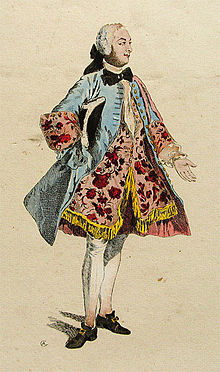Quinault-Dufresne
He made his début at the Comédie-Française on 7 October 1712, playing Orestes in Électre (1709) by Prosper Jolyot de Crébillon, and was admitted to the company in December.
He had striking good looks and musical talent, and he soon took over the male leading roles in both comedy and tragedy, and remained the star of the troupe until his retirement in 1741.
The Duchesse de Berry, eldest daughter of the Regent, attended five performances of Voltaire's "Oedipe", even though she was pregnant and public rumor attributed her condition to her incestuous relationship with her father.
The fecund young widow was said to be attracted to Quinault-Dufresne's beauty, prompting her to defy public opinion and admire the actor's physique.
He was always most closely identified with Le Glorieux (The Conceited Count, 1732), a smash-hit comedy written for him by Philippe Néricault Destouches.
